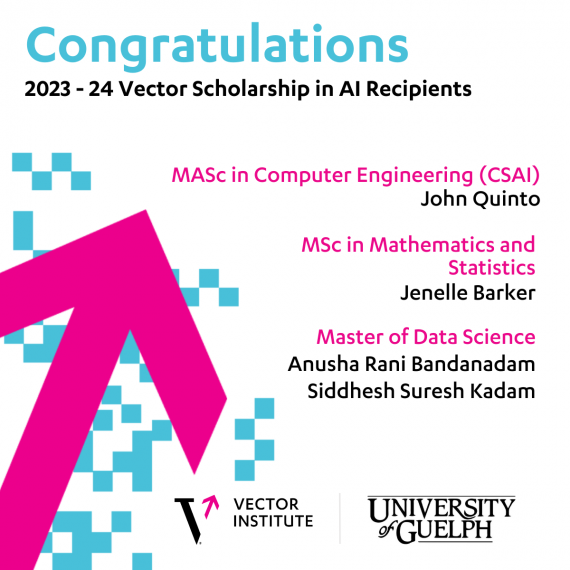CEPS Grad Students Receive $105,000 from Vector Institute

Six University of Guelph (U of G) students in the College of Engineering and Physical Sciences (CEPS) will receive $17,500 scholarships from the Vector Scholarships in Artificial Intelligence, to support their pursuit of a master’s degrees at U of G in Fall 2023.
Vector is based in Toronto and launched in 2017 with funding from the federal and provincial governments, industry sponsors and now 28 academic partners, including the University of Guelph. These scholarships represent one of the critical ways, Vector is supporting the next generation of experts in AI. Recipients are entering recognized master's programs in Ontario. AI research topics can range from machine learning, to engineering and computing to data science, to name a few, with applications across all sectors.
This year in CEPS, three scholarships were received by incoming Master of Data Science students: Somaye Ahangar Saryazdi, Anusha Rani, and Siddhesh Suresh. Three additional scholarships were received by Collaborative Specialization in AI students, Janelle Barker, Wakeel Kasali and John Quinto.

Vector recognizes both the Master of Data Science and Collaborative Specialization in AI to prepare graduates with AI skills and competencies needed by the industry.
“As our programming and research increases at U of G in AI, we will continue to see top talent apply here and succeed. The Vector Institute’s recognition of six of our students this year is a big part of that,” says Dr. Graham Taylor, academic co-director for the Centre for Advancing Responsible and Ethical Artificial Intelligence (CARE-AI) and recently named Research Director of the Vector Institute.
Recipients will also have opportunities to access Vector’s Digital Talent Hub, career development and networking events, career support programs specifically for AI.
Learn more about a few of our scholarship recipients:

John Quinto, CSAI
"To me, AI presents a way of tackling difficult real-world problems with statistics. It's critical that it be used benefit the common good, including applications that help preserve biodiversity. As we move towards more complex and powerful deep learning models, we need trained professionals to ensure that AI is used in a socially responsible way, and I wish to be part of the journey to ethical AI."

Siddhesh Suresh Kadam, MDS
"Artificial Intelligence is rapidly shaping innovations at an astonishing pace and uncovering endless applications in various domains. I am motivated to build sustainable AI applications involving GIS and want to explore potential solutions that address spatial challenges. I believe it is the responsibility of every AI professional to utilise and develop AI ethically. By collaborating with other talents in this industry, I am determined to pursue my passion and foster a fulfilling career in AI."

Jenelle Barker, CSAI
“Developments in AI and computing are highly inspired by research on the brain. The goal is to build computers that simulate human-level intelligence, such as being able to interact with the environment or make decisions and plan for the future. To implement this, we need to understand how our brains do these tasks; how do we process information, memorize, learn, imagine? I find this very interesting and hope to use the power of AI to improve the environment, for goals such as wildlife protection and conservation. My interest lies in statistics and machine learning, where a system learns from databases and algorithms, such as regression algorithms. However, since machine learning uses databases to learn, the issue of bias and discrimination is necessary to discuss. A lot of the data we use to train algorithms is often riddled with bias, such as data not being representative of a population. This may result in the algorithm making biased decisions. Therefore, it is crucial to collect and use fair, unbiased data in machine learning. Moreover, big data is continually growing, and classical machine learning algorithms require the use of human intervention to label the data. Thus, the demand for data scientists is increasing.”

Anusha Rani, MDS
"AI is not just a field of study, but a powerful tool that has the potential to transform the world as we know it. To me, AI is important because it holds the key to solving complex problems and unlocking new possibilities. It has the ability to revolutionize industries, improve healthcare, and tackle global challenges. Receiving this scholarship is both a validation of my dedication to academic pursuits and a financial relief, inspiring me to strive for excellence in my studies and future endeavors. With a focus on leveraging AI for transformative change, particularly in the health industry, I aim to develop intelligent data-driven systems that enhance decision-making, automate complex tasks, and empower individuals and communities through the transformative power of AI. Proper training and responsible development are paramount to ensure adherence to ethical standards and mitigate potential risks. By fostering a culture of education and awareness, we can collectively shape a future where AI is utilized safely and ethically, ultimately benefiting humanity as a whole."
Somaye Ahangar Saryazdi, MDS
"Machine learning holds great potential for national statistical organizations (NSOs) by automating certain processes or assisting humans to do processes. It allows NSO to use new data sources. My current goals of applying big data sources using machine learning techniques inspired me to pursue my studies in the Data Science program. It allows me to gain a better understanding of the added value of AI techniques in NSO by improving accuracy and reliability.”